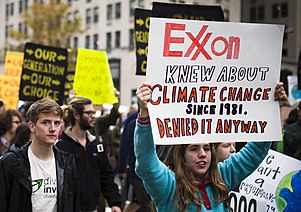
From the 1980s to mid 2000s, ExxonMobil was a leader in climate change denial, opposing regulations to curtail global warming. For example, ExxonMobil was a significant influence in preventing ratification of the Kyoto Protocol by the United States.[1] ExxonMobil funded organizations critical of the Kyoto Protocol and seeking to undermine public opinion about the scientific consensus that global warming is caused by the burning of fossil fuels. Of the major oil corporations, ExxonMobil has been the most active in the debate surrounding climate change.[1] According to a 2007 analysis by the Union of Concerned Scientists, the company used many of the same strategies, tactics, organizations, and personnel the tobacco industry used in its denials of the link between lung cancer and smoking.[2]
ExxonMobil has funded, among other groups, the Competitive Enterprise Institute, George C. Marshall Institute, Heartland Institute, the American Legislative Exchange Council and the International Policy Network.[3]: 67 [4][5] Between 1998 and 2004, ExxonMobil granted $16 million to advocacy organizations which disputed the impact of global warming.[6] From 1989 till April 2010, ExxonMobil and its predecessor Mobil purchased regular Thursday advertorials in The New York Times, The Washington Post, and The Wall Street Journal that said that the science of climate change was unsettled.[7]
An analysis conducted by The Carbon Brief in 2011 found that 9 out of 10 of the most prolific authors who cast doubt on climate change or speak against it had ties to ExxonMobil. Greenpeace have said that Koch industries invested more than US$50 million in the past 50 years on spreading doubts about climate change.[8][9][10]
Since the 1970s, ExxonMobil and its predecessors had engaged in climate research focusing on global warming. From the late 1970s and through the 1980s, Exxon funded internal and university collaborations, broadly in line with the developing public scientific approach. A review in 2023 found that the global warming projections documented by and the models created by ExxonMobil's own scientists between 1977 and 2003 had "accurately" projected and "skillfully" modeled global warming due to fossil fuel burning, and had reasonably estimated how much CO2 would lead to dangerous warming. The authors of the paper concluded: "Yet, whereas academic and government scientists worked to communicate what they knew to the public, ExxonMobil worked to deny it."[11][12]
In April 2014, ExxonMobil released a report publicly acknowledging climate change risk for the first time. ExxonMobil predicted that a rising global population, increasing living standards and increasing energy access would result in lower greenhouse gas emissions.[13] In 2015 it expressed support for a carbon tax.[14]
In 2015, the New York Attorney General launched an investigation whether ExxonMobil's statements to investors were consistent with the company's decades of extensive scientific research.[15][16] In October 2018, based on this investigation, ExxonMobil was sued by the State of New York, which claimed the company defrauded shareholders by downplaying the risks of climate change for its businesses.[17]
- ^ a b van den Hove, Sybille; Le Menestrel, Marc; de Bettignies, Henri-Claude (2002). "The oil industry and climate change: strategies and ethical dilemmas". Climate Policy. 2 (1): 3–18. Bibcode:2002CliPo...2....3V. doi:10.3763/cpol.2002.0202. ISSN 1469-3062.
- ^ "Smoke, Mirrors & Hot Air | Union of Concerned Scientists". www.ucsusa.org. Retrieved February 6, 2024.
- ^ Mann, Michael E. (2014). The hockey stick and the climate wars: dispatches from the front lines (Paperback ed.). New York: Columbia University Press. ISBN 978-0-231-52638-8.
- ^ Cite error: The named reference
:3was invoked but never defined (see the help page). - ^ Cite error: The named reference
:4was invoked but never defined (see the help page). - ^ Weart, S. (2025) The public and climate change. In: The Discovery of Global Warming
- ^ Cite error: The named reference
:7was invoked but never defined (see the help page). - ^ Cite error: The named reference
ExxonMobil and Koch Industries denial fundingwas invoked but never defined (see the help page). - ^ Cite error: The named reference
Greenpeace Study: Exposing the dirty money behind fake climate sciencewas invoked but never defined (see the help page). - ^ Cite error: The named reference
:8was invoked but never defined (see the help page). - ^ Cite error: The named reference
:9was invoked but never defined (see the help page). - ^ Cite error: The named reference
:10was invoked but never defined (see the help page). - ^ Cite error: The named reference
econowas invoked but never defined (see the help page). - ^ Cite error: The named reference
nyt20151105was invoked but never defined (see the help page). - ^ Cite error: The named reference
:11was invoked but never defined (see the help page). - ^ Cite error: The named reference
Times 10-24-18was invoked but never defined (see the help page).